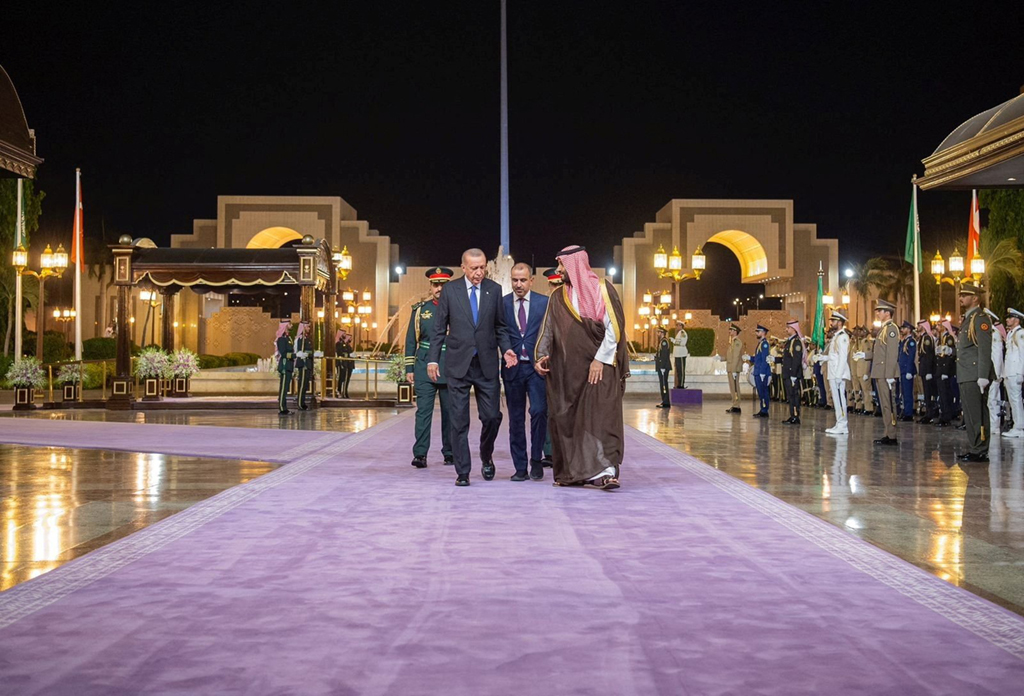As a reaction to certain regional and global developments, a large-scale normalization process was initiated in the Middle East at the beginning of 2020. As part of this normalization, Türkiye and the Gulf states normalized their relations three years ago to increase their autonomy and effectiveness in international politics.
President Recep Tayyip Erdoğan’s latest visit to three Gulf states, namely
Saudi Arabia,
the United Arab Emirates (UAE) and
Qatar between July 17 and July 19 was also held within this context. Erdoğan’s visit will have significant impacts on bilateral relations, regional politics and global developments. Therefore, it will be remembered as an indication of a new period in Turkish-Gulf relations. In this piece, I will briefly analyze the importance of the visit at three different levels.
At the bilateral level, Erdoğan’s visit will have a serious impact on the bilateral ties of the parties. The level of bilateral relations has reached the pre-Arab Spring level and has gone beyond it. The trade volume between Türkiye and the Gulf states has set new records and will further increase and diversify after the signing of many agreements.
Also, bilateral relations will gain new dimensions besides bilateral trade. On the one hand, the economic actors in the Gulf will increase investments in Türkiye; and on the other hand, Turkish economic actors will take advantage of new opportunities in the Gulf. For example, Baykar, one of the leading Turkish firms in the defense industry and a prominent drone manufacturer at the global level, has signed an agreement with its Saudi counterparts. This agreement was announced as the largest agreement in the history of Türkiye. Similarly, Türkiye and the UAE have signed financial and economic agreements worth approximately $51 billion (TL 1.37 trillion).
Thus, Türkiye will be able to reach new export markets that will contribute to the further growth of its increasingly diversified economy. On the other hand, the Gulf states will be able to reduce their dependence on Western states, especially for defense industry products.
Regional perspective
At the regional level, Erdoğan’s visit will have substantial impacts on regional developments and crises. The visit will move relations between the regional states to stable grounds, go beyond the three-year normalization process and increase expectations for the establishment of a new regional order.
First of all, Middle Eastern states, including Türkiye and the Gulf states, are not satisfied with the unilateral and interventionist policies of global powers. They do not trust global powers since they rightly think that they cannot be the subject and victim of global negotiations and conflicts. They do not want to be part of the tension between Western and non-Western power centers. On the contrary, they want to prioritize the development of cooperation fields. For example, with this visit, the Gulf states have turned to Türkiye to purchase defense industry products, instead of their traditional suppliers, the Western countries who place conditions on the use of the defense industry products.
Secondly, Türkiye and the Gulf states know that regional issues can only be solved by cooperating with other regional actors. The solution to regional problems such as the Syrian and Libyan crises, in which global actors are involved becomes much more difficult, if not impossible. After solving their bilateral problems, Türkiye and the Gulf can cooperate in regional crises such as the Yemen crisis.
Thirdly, the development of ties between Türkiye and the Gulf states will deeply affect power balances in the Eastern Mediterranean. In recent years, Greece has exploited Türkiye’s tense relations with the Middle Eastern states and tried to isolate Türkiye in the region. Türkiye’s resistance policy prevented any development against the national interests of Türkiye. With the return to cooperative relations, the Greek-centered alliance formed against Türkiye was dissolved. After the latest steps, Gulf states such as the UAE and Saudi Arabia will be quite careful in their relations with Greece. Türkiye will be always taken into consideration in the Eastern Mediterranean.
Global impact
At the global level, Erdoğan’s visit will have large-scale implications. Erdoğan, who recently opened a new page in Türkiye-West relations at NATO’s Vilnius summit, initiated a new process in Türkiye-Arab relations. With one foot in the West and the other in the East, the increasing importance of Türkiye on the one side will contribute to the importance of Ankara on the other side. In other words, Türkiye as a key player in the Western security apparatus is more important for its non-Western partners, and vice versa.
On the other hand, Middle Eastern countries uncomfortable with the interventionist and unilateral policies of the United States are trying to improve relations with other regional and global powers to increase their influence in the international system. While Türkiye tries to consolidate its leadership role in the Middle East, the Gulf states try to attach greater importance to their relations with Türkiye. Both Türkiye and the Gulf states try to reduce their dependence on global actors. Consequently, global powers will lose their relative influence in the Middle East during the process of regionalization and normalization in the region.
All in all, Türkiye and the Gulf states have been trying to recalibrate both their bilateral relations and their place in the regional order. It seems that they have been learning from their recent mistakes made during the Arab insurgencies and revolutions. The intensifying global competition and other global challenges will force them to improve their cooperation soon.
[Daily Sabah, July 26, 2023]







